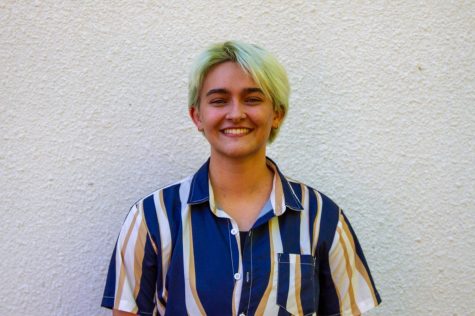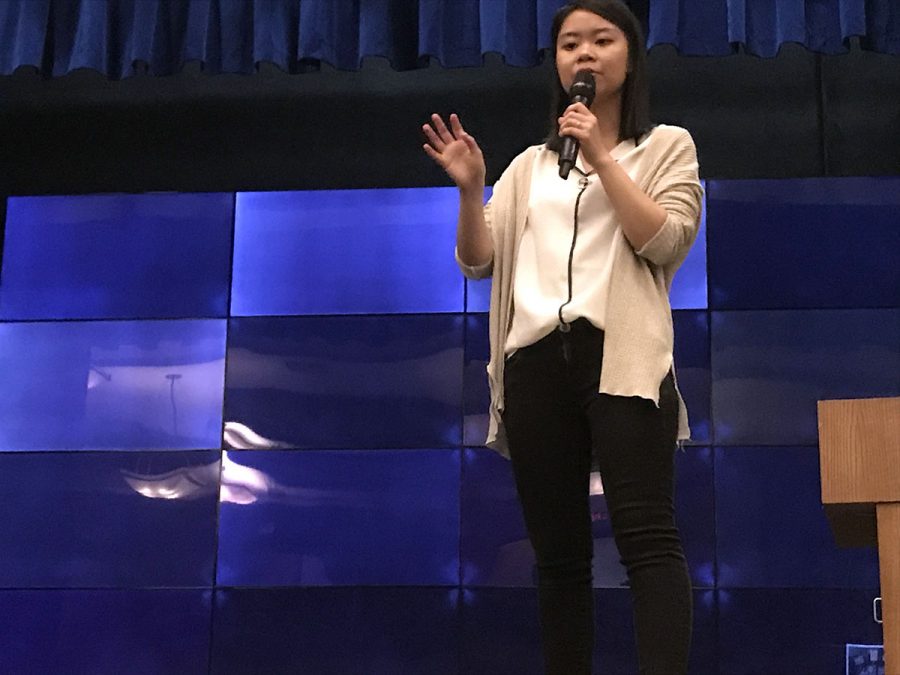‘Mi Tu’ in China
Chinese activist visits campus with a presentation on feminism in China
Photo by Lauren Spierings
Mao Zedong, the founder of the People’s Republic of China, gave the famous quote of “Women hold up half the sky’ to strive for equality in China,” something that Liang says has not been achieved.
Xiaowen Liang was born in 1992 in China, while its one-child policy was still in effect. Because of this, her family focused on putting her through school and providing solely for her.
This is why she didn’t realize she was being discriminated on the basis of gender until she went to college, she said.
“When I went to college, I became a volunteer of an LGBT organization for youth,” Liang said. “And then, from that organization, I met a lot of feminist activists and they told me about feminism.”
As a part of Asian American Pacific Islander Heritage Month, Liang was invited to campus by Dang Yang, the director of the Office of Multicultural Affairs, and Caitlin Lee, the Equal Opportunity Program Specialist.
Yang said they wanted this year’s event to focus on the complex idea of Asian identity in order to delve past typical Asian stereotypes and present topics and ideas that would show that complexity.
“We wanted to delve into sexual orientation, current events, historical context and much more complex and nuanced topics,” Yang said. “Xiaowen was chosen to be a part of this celebration because of her role in the Chinese feminist movement — a topic that is in alignment with this year’s goal.”
Liang visited UW-Eau Claire on Thursday, May 2. OMA held a Brown Paper Bag Lunch, where students could talk with Liang in a small setting, and also hosted a presentation in the Schofield Auditorium later the same day, where Liang spoke about her story concerning feminist activism in her home country.
“It was very relevant because there’s a demonization of China and its people going on within our politics and the current administration,” Benny Ramirez said, a first-year Latin American studies student. “So it’s important to understand the perspective of someone who has been through it, who has interacted with the actual government.”
Throughout her presentations, she talked about the various campaigns she has been a part of in the name of feminism and why she felt she had to leave China to help further their efforts.
Equality between men and women has been emphasized in Chinese laws since Mao Zedong started the People’s Republic of China in 1949, Liang said. However, this equality is not exemplified today.
“A lot of (women) were awakening, having this awareness that China is a patriarchal society,” Liang said. “And, we want changes for our society. And that demand frightens our government.”
Liang’s presentation covered the various campaigns she had been part of since her start into activism in 2012.
The campaigns she participated in discuss issues ranging from bathroom discrimination to domestic violence awareness. For a time, those campaigns were quite successful as the media gave coverage of feminist demonstrations for the nation to see, Liang said.
“In China, we’ve found that street demonstrations are actually taboo and you will always feel like it’s very dangerous to protest on streets,” Liang said. “The government’s been telling you student protest marches and rallies will turn into chaos.”
However, that success soon changed in 2015. In an event that created China’s Feminist Five, arrests of several activists who were handing out stickers about anti-sexual harassment on public transport on the eve of International Women’s Day.
Sparking international interest, the five activists were eventually released 37 days later from custody. However, the feminist organization that Liang was part of, called Hangzhou Weizhiming, was shut down soon afterwards.
Since the government would no longer allow the media to cover their demonstrations, Liang said, the feminist movement in China moved to using lawsuits and social media to push their ideas forward.
Liang also mentioned the #MeToo movement from the United States furthering feminist values in China, spreading to the nation through Hollywood and entertainment.
Liang said that the first big #MeToo case on social media came to attention on Jan. 1, 2018. A woman had written an open letter and posted it online about the sexual harassment she had faced from her supervisors in school.
Within a week, it got up to 3 billion reviews before the government took down the hashtag.
“#MeToo activists used different hashtags to get around the censorship,” Liang said. “They invented #ricebunny in China because ‘rice’ sounds like ‘me’ in Chinese and ‘bunny’ sounds like ‘too’ in Chinese.”
While this circumvention of censorship did work for three more weeks, the new hashtag was also taken down. Other tags blocked by the Chinese government include words like “gay” or “lesbian.”
Despite suffering personal attacks and police interest in her family, Liang has stuck with feminist activism to today. The attacks on her person and her looks only make her more determined, Liang explained.
“I thought, ‘If I were a man, would they do the same?’” Liang said. “The answer is no. A lot of men activists did the same thing as me and they would never receive attacks based on their looks. I realized this is one of the reasons and one of the motivations that gets me going.”
Spierings can be reached at spierilp1654@uwec.edu.

Timothy Spierings is a fourth-year Spanish and journalism student. This is their eighth semester on The Spectator staff. They enjoy trying all types of new foods and listening to new music artists and are currently trying to learn the bass guitar.

Timothy Spierings is a fourth-year Spanish and journalism student. This is their eighth semester on The Spectator staff. They enjoy trying all types of new foods and listening to new music artists and are currently trying to learn the bass guitar.



Muriel Spierings • May 8, 2019 at 1:26 pm
Must have been an interesting interview for you. Did she have a hard time getting away from China? Where is she getting the finances for her travels here? Bet you wish you could have had an extended visit.